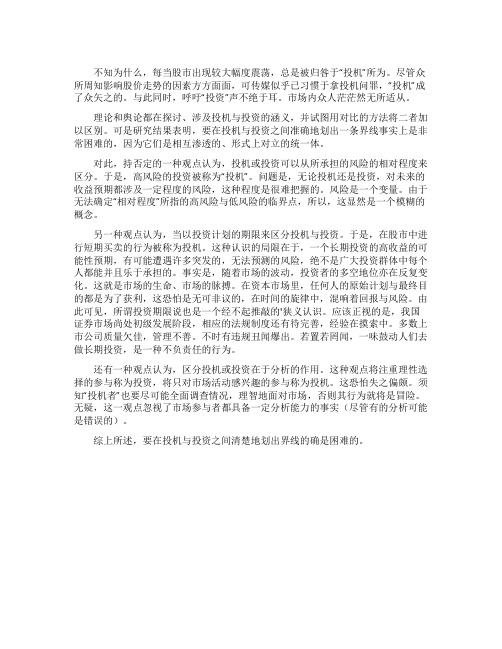Investment vs Speculation 投资与投机
- 格式:doc
- 大小:42.00 KB
- 文档页数:4

精读《证券分析》:投资与投机什么是投资?什么是投机?很多人分不清这两者的区别。
持怀疑论的人甚至认为“投资其实就是成功的投机,投机只不过是不成功的投资。
”格雷厄姆在对投资与投机的区分上有着深入的见解:“投资是经过深入彻底的分析,保证获得本金安全和满意回报的活动。
不符合这些要求的活动就是投机。
”"An investment operation is one which, upon thorough analysis, promises safety of principal and a satisfactory return. Operations not meeting these requirements are speculative."这个定义有几层含义:第一,投资是一种活动,而不是某种固定的东西,或者仅仅是购买行为。
并不是说某种特定的东西,如债券,房子,艺术品,古董,就存在内在的投资特性,其他东西,如股票就不具有内在的投资特性。
价格在投资中有着至关重要的作用,股票债券等在一个价格具有投资的价值,但在另外一个价格可能就不具有投资价值。
另外,单单购买一只证券可能风险巨大,但购买一组证券进行分散就有可能有足够的安全。
另外,不仅是购买,套利和对冲也可以是投资。
第二,“深入彻底的分析”指的是根据已经确立的安全和价值的标准研究事实。
第三,“安全”指的不是绝对的和完全的安全,而是在正常及合理的可能的情况下,获得保护免受损失。
第四,“满意的回报”是一个主观的指标,因人而异。
第五,投资必须永远同时考虑“价格”和“质量”两个因素。
没有绝对的不论什么价格都属于投资的东西。
格雷厄姆说:“在我们看来,大部分运营良好的公司的股票,在大部分时间里都属于投机。
因为这些股票的价格过高,根本无法保证本金安全。
”除了第一条对投资与投机的定义,格雷厄姆还补充了一条对投资的要求:“投资是可以同时通过定性和定量层次考验,得到证实的活动。

股票市场的投机与投资的区别在股票市场中,投机和投资是两种常见的交易策略。
虽然这两者的目标都是获利,但是它们的本质和运作方式却存在明显的区别。
本文将探讨股票市场中投机和投资的区别,并解释为何投资比投机更加可持续和长期可行。
一、投机概述投机是指在股票市场中短期买卖股票,利用短期价格波动赚取差价的行为。
投机者通常以迅速变现为目标,他们依赖市场瞬息万变的价格波动,通过频繁买入和卖出来实现利润的获取。
投机的特点为高风险、高回报、短期操作,并且需要相对较多的投资时间和精力。
投机者通常使用技术分析、图表模式、市场情绪等工具来预测股票价格的走势。
他们不关心公司的基本面和长期价值,只关注价格的涨跌幅度。
投机者大多数情况下短期持有股票,尽快获利后就会离场。
他们的主要目标是追求快速的利润,而非长期投资。
投机策略有时会采用杠杆操作,即使用借贷资金进行交易,以扩大收益。
然而,投机也伴随着高风险。
由于价格波动不可预测,投机者面临着较高的市场风险,有可能蒙受巨大的损失。
二、投资概述相对于投机,投资是指通过购买优质股票,并长期持有,从中获取持续的收益。
投资者关注公司的基本面、财务状况和长期价值,通过对股票的深度研究和分析来判断其投资潜力。
投资的特点为低风险、稳定回报、长期操作,并且需要相对较少的投资时间和精力。
投资者通常采用基本面分析、公司估值、市场前景等方法来确定股票的投资价值。
他们注重长期增长潜力和分红回报,往往选择具备稳定盈利能力和可持续发展优势的公司进行投资。
与投机者不同,投资者通常会长期持有股票,不会受到短期价格波动的干扰。
投资的目标是实现持续稳定的收益和资本增值。
投资者更看重风险控制和资产配置的合理性,通过分散投资、长期持有和适时调整来管理风险。
相较于投机,投资更加注重长期资产管理和财务规划。
三、区别与优劣投机与投资在股票市场中存在明显的区别。
首先,投机侧重于短期操作和短期利润,而投资则追求长期价值和持续收益。
投机者通常关注短期的价格波动,将投资视为一种快速赚钱的手段;投资者则更注重公司的基本面和长期投资价值。

英语课程中的投资与证券交易词汇在如今全球化的商业环境下,掌握英语对于从事金融和投资领域的人来说至关重要。
尤其是在投资与证券交易方面,了解相关词汇和术语是提高沟通能力和拓宽职业发展的关键因素之一。
本文将介绍一些在英语课程中常见的投资与证券交易词汇,以帮助读者更好地理解和运用这些词汇。
一、投资词汇1. Investment(投资)指将资金或其他资源用于期望获取回报的行为或活动。
2. Portfolio(投资组合)指个人或机构持有的所有投资项目的集合。
3. Asset(资产)指拥有的有价值的物品或权益,如股票、债券、不动产等。
4. Equity(股权)指投资者在公司中所持有的股份或股权。
5. Risk(风险)指投资可能面临的损失或不确定性。
6. Return(回报)指投资所产生的利润、收益或回报。
7. Diversification(分散投资)指将资金投资于多个不同的资产类别或领域,以降低风险。
二、证券交易词汇1. Stock(股票)指公司向公众发行的股份,代表持有者在公司中的权益。
2. Shareholder(股东)指持有某公司股份的个人或机构。
3. Dividend(红利)指公司根据盈利情况向股东支付的利润分配。
4. Bond(债券)指借款人以借款为基础发行给债权人的债务证券。
5. Coupon(票息)指债券上规定的每年支付给债券持有者的利息。
6. Principal(本金)指债券上规定的借款人要偿还给债权人的原始金额。
7. Maturity(到期日)指债券或其他金融产品到期的日期。
8. Yield(收益率)指投资产品的盈利能力及其相对于投资成本的比例。
三、其他相关词汇1. Broker(经纪人)指在买卖证券或货币等产品过程中充当中介的个人或公司。
2. Exchange(交易所)指进行证券交易的市场,例如纽约证券交易所(NYSE)。
3. Bull market(牛市)指证券市场价格持续上涨的市场状态。

名词解释投机
投机(speculation)是指在金融市场上利用短期时间内价格波动,通过买入低价后卖出高价来获取利润的行为。
投机者通常不关心资产的实际价值,而是通过市场供求关系和市场心理的影响来预测价格的改变,并据此进行买卖交易。
投机者的目的是获取短期内的利润,而不是持有资产获得长期投资回报。
他们通常会寻找价格波动较大的资产,如股票、期货、外汇等来进行投机交易。
投机的核心是市场预期的推测。
投机者通过分析市场条件、经济数据、政策变化等因素,判断市场的未来走势。
他们相信市场会对这些因素做出反应,从而导致价格的波动。
投机者会将这些预期转化为交易策略,根据市场的变化进行买入或卖出的决策。
然而,投机并不是一种风险无限的行为。
投机者通常会采取一些风险管理的措施,如设置止损位来限制亏损,使用衍生品工具来对冲风险等。
他们会根据自己的风险承受能力和投资目标来制定风险管理策略。
投机在金融市场中扮演了重要的角色。
它可以提高市场的流动性,增加市场的参与者,并促使市场更有效地反映供求关系。
投机也可以提供风险管理的工具,如期货、期权等,让市场参与者可以通过这些工具进行套期保值。
然而,投机也存在一定的风险和负面影响。
过度的投机活动可
能导致价格的剧烈波动,甚至引发金融市场的崩盘。
此外,一些投机者可能会利用市场操纵手法来获取不当利益,损害市场的公平性和透明度。
总之,投机是一种利用市场波动来获取短期利润的行为。
它在金融市场中发挥了重要的作用,但同时也存在一定的风险和负面影响。
合理规范投机活动,是保持金融市场的稳定和健康发展不可或缺的一环。

不知为什么,每当股市出现较大幅度震荡,总是被归咎于“投机”所为。
尽管众所周知影响股价走势的因素方方面面,可传媒似乎已习惯于拿投机问罪,“投机”成了众矢之的。
与此同时,呼吁“投资”声不绝于耳。
市场内众人茫茫然无所适从。
理论和舆论都在探讨、涉及投机与投资的涵义,并试图用对比的方法将二者加以区别。
可是研究结果表明,要在投机与投资之间准确地划出一条界线事实上是非常困难的,因为它们是相互渗透的、形式上对立的统一体。
对此,持否定的一种观点认为,投机或投资可以从所承担的风险的相对程度来区分。
于是,高风险的投资被称为“投机”。
问题是,无论投机还是投资,对未来的收益预期都涉及一定程度的风险,这种程度是很难把握的。
风险是一个变量。
由于无法确定“相对程度”所指的高风险与低风险的临界点,所以,这显然是一个模糊的概念。
另一种观点认为,当以投资计划的期限来区分投机与投资。
于是,在股市中进行短期买卖的行为被称为投机。
这种认识的局限在于,一个长期投资的高收益的可能性预期,有可能遭遇许多突发的,无法预测的风险,绝不是广大投资群体中每个人都能并且乐于承担的。
事实是,随着市场的波动,投资者的多空地位亦在反复变化。
这就是市场的生命、市场的脉搏。
在资本市场里,任何人的原始计划与最终目的都是为了获利,这恐怕是无可非议的,在时间的旋律中,混响着回报与风险。
由此可见,所谓投资期限说也是一个经不起推敲的'狭义认识。
应该正视的是,我国证券市场尚处初级发展阶段,相应的法规制度还有待完善,经验在摸索中。
多数上市公司质量欠佳,管理不善。
不时有违规丑闻爆出。
若置若罔闻,一味鼓动人们去做长期投资,是一种不负责任的行为。
还有一种观点认为,区分投机或投资在于分析的作用。
这种观点将注重理性选择的参与称为投资,将只对市场活动感兴趣的参与称为投机。
这恐怕失之偏颇。
须知“投机者”也要尽可能全面调查情况,理智地面对市场,否则其行为就将是冒险。
无疑,这一观点忽视了市场参与者都具备一定分析能力的事实(尽管有的分析可能是错误的)。

{财务管理投资管理}投资和投机组目录投资的概念投资的类型投资的特点投资的作用投机的概念投机的分类投机的作用投资与投机的区别投资投机投资(拼音:touzi 英文:Investment)指货币转化为资本的过程,也是指投资者当期投入一定数额的资金而期望在未来获得回报。
从金融学角度从技术角度相较于投机而言,投资的时间段更长一些,更趋向是为了在未来一定时间段内获得某种比较持续稳定的现金流收益,是未来收益的累积。
这个词意味着“将某物品放入其他地方的行动”(或许最初是与人的服装或“礼服”相关)。
123实物投资资本投资证券投资1 实物投资是指企业以现金、实物、无形资产等投入其他企业进行的投资。
它具有与生产经营紧密联系、投资回收期较长、投资变现速度慢、流动性差等特点。
实物投资包括联营投资、兼并投资等。
2 资本投资是指投入资金运用于购置和建造固定资产或是投入资金运用于增加流动资产以满足生产和经营中周转的需要。
资本投资包括固定资产投资、流动资产投资等。
3 证券投资是指投资者(法人或自然人)购买股票、债券、基金等有价证券以及有价证券的衍生品,以获取红利、利息及资本利得的投资行为和投资过程,是间接投资的重要形式。
投资是以让渡其他资产而换取的另一项资产。
投资是企业在生产经营过程之外持有的资产。
投资是一种以权利为表现形式的资产。
投资是一种具有财务风险的资产。
投资对经济增长影响投资与经济增长的关系非常紧密。
投资是经济增长的基本推动力,是经济增长的必要前提。
投资对经济增长的影响,可以从要素投入和资源配置来分析。
投资是促进技术进步的主要因素一方面,投资是技术进步的载体,它是技术与经济之间联系的纽带另一方面,技术本身也是一种投资的结构投机指根据对市场的判断,把握机会,利用市场出现的价差进行买卖从中获得利润的交易行为。
长线投机者短线交易者逐小利者此类交易者在买入或卖出期货合约后,通常将合约持有几天、几周甚至几个月,待价格对其有利时才将合约对冲一般进行当日或某一交易节的期货合约买卖,其持仓不过夜又称"抢帽子者",他们的技巧是利用价格的微小变动进行交易来获取微利,一天之内他们可以做多个回合的买卖交易。
本杰明·格雷厄姆所创立的证券分析理论体系的一个显著特点,就是通过对证券领域里一些重要的经济范畴的历史审视和深刻剖析,力图澄清弥漫其上的种种迷惑纷乱的表象,揭示其中所蕴含的尚未被人们所真正认识的实质,促成证券投资者树立科学、理性、安全、有效的证券投资理念。
基于“投资”与“投机”在证券市场中所具有的广泛影响和突出作用,故而对其进行全面彻底地审视和赋予确切的定义,便成为格雷厄姆构建证券分析理论体系的一项重要工作。
在格雷厄姆所处的上个世纪的三十年代里,资本市场上对于“投资”与“投机”的定义,在认识上往往存在着不同的观点。
人们从不同的角度出发,对于两者之间的概念、关系、作用以至差别等,有着不相一致的、甚或是大相径庭的认识。
对于认同两者之间存在着差异、属于两个不同的重要经济概念者来说,投资与投机的区别是可以从证券买卖的对象、付款的方式、持有股票的时间长短以及是否为安全收益或预期风险收益等特征来加以划分。
但是,投资与投机在概念和实际运作中粘合的是如此密切,难以区分,以至于被许多伤透脑筋的市场人士干脆定论为:“投资是一种成功的投机,而投机是一次不成功的投资”,将两者合二为一,视作只是同一种行为的两种不同的表现形式或说法而已。
格雷厄姆不赞成上述肤浅的认识。
通过大量的市场分析和理论研究,他形成了自己独特的见解。
他认为将投资与投机等同为一的观念并不足取,因为持之者只是从两者活动的最终结果来对其加以界定,而不是在全面地分析其基本特征后加以定义。
他明确地指出,“投资”与“投机”是两个截然不同的经济范畴,两者之间存在着显著的、本质上的差别。
这种差别,并不是完全表现在诸如购买的对象是债券或是股票,采取的方式是现金交易还是保证金交易,持有的股票时间是长期或是短期,投资的目的是实现安全性收益或是风险性收益等表象上。
之所以如此,是因为持有上述的评判标准本身都是难以确定的、并且总是处于变化状态下或捉摸不定的。
所以,上述的差别并没有触及到两者本质上的特征,不能作为确切定义的依据。
投资与投机之间的区别和判断在金融领域,投资和投机是两个不同的概念。
虽然这两者都涉及到资本和金融市场,但是它们的目的和方式却大不相同。
投资注重长期价值和稳健的回报,而投机则追求短期收益和高风险。
了解投资和投机之间的区别,可以帮助我们在金融市场中做出正确的决策,从而获得更好的财务收益。
什么是投资?投资是长期持有和管理资产,以创造长期价值和稳健回报的过程。
投资者通常选择多样化的投资组合,包括股票、债券、房地产和其他有形或无形资产。
投资的目的是获得具有持久力和可持续性的收益。
投资的主要特点是风险分散和长期持有。
投资者通过投资不同类型和不同行业的品种来降低投资组合的风险,以保证投资组合的长期增值。
另外,投资者通常长期持有自己的资产,以便在时间的影响下,获得更高的收益。
什么是投机?投机是短期和高风险的投资行为。
投机者通过利用市场价格波动,获得快速和高额回报的投资行为。
投机者通常选择高风险、高收益的投资品种,如期货、外汇、股票等。
投机的目的是快速获得收益,而不是长期收益。
投机的主要特点是高风险和短期收益。
投机者通常对市场价格变化有较高的预测能力,以便在价格波动时快速购买和出售资产。
但是,投机者往往最终会受到市场波动的影响,导致投资亏损。
如何判断投资和投机?判断投资和投机的关键是看投资者的目的和投资方式。
如果一个人的主要目的是获得长期价值和稳健的回报,那么他的投资行为就是投资。
如果一个人的目的是追求短期收益和高风险,那么他就是在进行投机。
此外,投资者的投资组合也可以反映投资和投机。
如果投资组合具有多元化并包含长期持有的资产,那么它就可能是投资组合。
如果投资组合是使用高风险、高回报的短线交易策略,那么它可能更相似于投机。
结语投资和投机在金融领域具有不同的内涵和含义。
投资注重长期稳健的增值,而投机则追求短期高收益和高风险。
在做出金融决策时,理解投资和投机的区别,找到适合自己的投资策略,才能够获得更高的财务收益。
宏观·策略|投资策略Macroeconomy·Strategy胡语文投机与投资的区别有一个关于市场疯狂的古老故事。
说的是沙丁鱼交易。
当时沙丁鱼从位于加利福尼亚蒙特利尔的习惯水域消失了。
商品交易商们乘机哄抬价格,致使每罐沙丁鱼的价格一路高涨。
一天,一个买家决定用一顿昂贵的大餐来款待一下自己,他打开了一个罐头吃起来。
他立刻感觉不适,于是他对卖主抱怨这罐头变质了。
卖主说:“你不了解,这些沙丁鱼不是用来食用的,它们是用来做交易的。
”就像沙丁鱼交易商,很多金融市场的参与者沉迷于投机,他们从未品尝过正在交易的沙丁鱼。
投机给人一种获得快速回报的前景,如果能够在一天内赚到涨停板,那为什么还要追求一年10%的收益呢?而且多数人认可的东西总是让人感到放心,他们从多数中获取信心。
就像现在大家抢着要买一套房子一样。
正如《安全边际》的作者塞思·卡拉曼所言,理解投资和投机之间的区别是取得投资成功的第一步。
事实上,投资与投机的区别早在50多年前就被本杰明·格雷厄姆和戴维·多德在他们著名的、被认为是价值投资的圣经——《证券分析》中阐述过了。
卡拉曼认为,投资者相信从长远来看,证券价格趋向于反映相应企业的基本面。
因此,股票投资者期望至少以下述三种方式之一获利:企业运营所产生的自由现金流,这将反映在更高的股价或者被分配的股息上;投资者愿意以更高的比率(市净率或者市盈率)来购买股票,这将反映在更高的股价上;或通过缩小股票价格与企业价值之间的差距。
相反,投机者则根据证券价格下一步会上涨还是下跌的预测来买卖证券。
他们对价格走向的预测不是基于基本面,而是基于对其他人买卖行为的揣摩(例如:投机者很关心庄家、主力机构资金的买卖及市场资金流向)。
他们将证券看成是可以被反复换手的纸张,通常对投资的基本理念一无所知或者漠不关心。
他们买入证券是因为这些证券的市场表现好,反之则卖出。
的确,假设明天就是世界末日,一些投机者仍有可能根据他们对今天市场走向的猜测来继续进行证券交易。
Investment vs Speculation/view/210838/178045?from=rss_relatedWhen it comes to housing prices, people often tend to confuse investment and speculation. In fact, there is a huge difference between the two. Buying houses for investment is always welcome, but if it is used for speculation, then it is not the case. At present in China's real estate market , it is not the investment but the speculation that is excessive. In this case, we should differentiate between investment housing and speculative housing on housing policies, encourage the former but prevent the latter.Investment is to invest funds at one time, and to be rewarded in subsequent years. Apart from principals , profits will be gained in a few years. For example, the capital gained from rent when buying houses for rent and the projects with profits every year when buying houses for the construction of factories, parking lots and warehouses are all investments.Buying houses for nothing and selling it after the price rises is speculative. There is a huge difference between the two kinds of housing sales. In stock market, buying and holding the stocks until getting the bonus is investment. Selling the stock after the price rises and making money from prices fluctuation is speculative.There is difference of speculation and investment in general merchandise . Trading for normal consumption and production is investment. While neither production nor consumption take place, but people are engaged in trade, to buy is to sell and m ake money from prices fluctuation , which is speculative.Is speculation beneficial or harmful to society? if money is made, wealth will be created, which is beneficial. If money is lost, it will be harmful to society. I have explained the reasons for it in details in the previous works I have written. Because of it, governments allow the existence of speculation. For example, futures market is a speculative market, which is beneficial to society.All trading can be divided into speculative trading and investment trading. Therefore, all the people involved can be divided into Speculative Group and Investment Group. People may earn money or lose money in speculation. So as a whole, speculative group will earn and lose money. If money is made after offset, the speculative group create wealth for society. ;If money is lost, the speculative group will cause a great loss for society. If speculation depends completely on luck, the probability of making and losing money is almost equal, which has no effect on society.( if the human resources andmaterials consumed are not included.) Therefore, speculation should be done by experts in speculation , who have a specialized knowledge of the market, specialize in estimating the trend of prices and earn money easily.Speculators must study and judge the prices of the market if they want to make money. For example, as for the food prices, the general rule is that the price is low in fall and high in spring. Therefore, if you buy food in fall and sell it in spring, you can make money. They regulate the surplus and deficiency in time, and smoot h out the price fluctuation, which contributes to society. But if too many people spe culates, they all buy food in fall, the food price will be artificially raised even higher than that in spring. At this time, the price is not decided by normal consumers an d producers but by speculators. When speculators confuse the market, none will m ake money.If a normal market is operated by a few experts in speculation , money will be make, which is beneficial to society. But if there are too many speculators, the price will be decided by speculators rather than by the normal consumption and production. Then speculation will be turned into gambling, which is of no benefit to society. problems of too many speculators in China's real estate market and the stock market exist. In these markets, whether people will make money or not depends entirely on luck, they neither smooth the price fluctuation nor predict the trend of prices.As for the real estate market, it is easy to differentiate the two different kinds of m otives sales. If people buy a house to live in by themselves or to rent, it is an inv estment house. While buying a house to sell after the price rises, it is an speculati ve house.Speculative housing must be available. It will become an investment hous e if someone lives in it. The house that can be put into the market at any time m ust be available. Transaction is difficult if someone lives in the house. The vacancy rate is high among the houses sold in large cities, indicating a lot of speculation i n housing. These houses are for sale anytime and anywhere. Once the housing pri ce decreases a little, speculators will find an early sell in order to avoid hold-up w hen everyone strives to buy houses early.Theoretically speaking, investment housing and speculative housing can be converted to each other.Houses for speculation can also be rented temporarily to earn rent, which then becomes an investment in housing.In fact, however, the reality we see is not the case.The national vacancy rate is so high , why don't they gain some additional rental by renting?It seems that it doesn't prevent the sale of housing. But houses left vacant for two or three years are abound, which means that the houses intended to see is not for rent.But if so many vacant houses are intended to rent, the rental prices will decline further. The current rent ratio (the ratio between rental price and buying price) has not been beneficial to buy a house, because to rent a house is far more cost-effective than to buy a pared with the price increase in real estate, the profits of rental housing appears to be negligible. Therefore, the owners of speculative housing don't care about the rent earned by renting. Relatively low rent has impeded the convert from speculative housing into investment housing. Generally speaking, therefore, it is fine to divide the purposes of buying houses into investment and speculation.There are different policies for different purposes of buying a house in order to improve the real estate market effectively. Now it is a good policy to impose property tax on luxurious houses.But the best way to curb speculation is to impose high tax on the sale of housing, which makes most speculators use what they have gained from speculation in real estate to pay tax.Nowadays, the speculation in real estate is too excessive, which needs suppressing .Butwe cant go to the other extreme, that is, a complete ban on speculation in real estate.A certain degree of speculation should not only be allowed but also necessary. That is to say, the vacancy rate should be kept in a proper number, because too low vacancy rate will block the transactions in real estate market. There were neither vacant houses nor real estate market in the planned economy. Changing houses was carried out by exchanging houses.The main reason for exchanging houses is to work nearby. Changing houses is different from market exchange, no capital is involved in the former and the price fluctuation can't be compensated. Only when both parties think its beneficial to them does the exchange succeed. This kind of pairing is not easy to succeed. From two parties to three parties, until 30 families exchange houses at the same time, the exchange can make all people satisfied.Because there is no vacant house to turn over, all people have to move on the same day if houses are exchanged.Tianjin once organised 30 families to change houses, which was spectacular . If there are vacant houses to turn over, there is no need for people to move together. This shows that it is essential to maintain a certain number of houses to facilitate the flow.By the way, the fact that people exchange houses proves that the value of the house vary from the people who use it, not just decided by the cost. When different people use the same house, the value is different. In other words, improving allocation can increase the enjoyment of whole society, which is the reason why economy studies the allocation of resources. If the society is to be wealthy, we should produce more, make the most of human resources and materials , and put what we produce into good use. The best way is to improve the allocation of resources by exchanging houses. Furthermore, the approach to increasing production is to improve the allocation of labor, capital and raw materials , and improve their value in use.Therefore, to improve the allocation of resources is the fundamental approach to social wealth.There are some reasons why so many speculative housing exist.First, high economic growth, high wealth accumulation and income distribution tilting the rich make some people have lots of money at hand.They don't have better opportunities to invest with this money and fear of currency depreciation, so the most convenient means of hedge is to buy houses.They have already had their own houses, so the reason for buying houses is merely to hedge and increase the value. They wait for a good price to sell .Nowadays, in order to curb housing prices, the government limits the means of buying a house, such as increasing the ratio of down payment, increasing the interest of the mortgage, not allowing selling the second suite or household constraints, but these methods are not sparse but blocking . There is still money left in the hands of people and is finding way out. If a lot of money floods into the stock market, the stock market will soar, which is also foam and hard to treat. The fundamental approach is to provide lots of opportunities for people to make money, so they won't buy houses again. The original capital market can be lifted, such as financial services, telecommunications, petrochemical, or providing opportunities of foreign investment for people and encouraging private capital into health care, education and other services.This is thefundamental solution to the problem.。